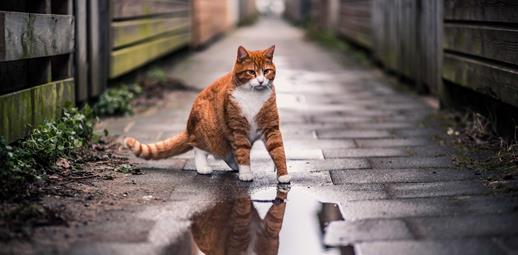
It’s not uncommon for a pet to go missing. Smells, sounds and other animals can easily lead them to a place they’re not familiar with. It can be a scary time for a pet owner but, usually, they won’t have wandered very far.
Here are some of the things you can do to help find your pet if they go missing.
Start at home
In most instances, your pet probably won’t be far away. So try calling for them from outside your home. Shake their food bowl, if that’s what normally draws them in. Try and sound cheerful and welcoming when you do this to avoid scaring them off.
Search hiding places and potential traps
It’s easy for pets to get stuck or hide in small spaces in your home or garden, or they may accidentally get locked inside a garage, shed or other outbuilding. Thoroughly search all of these places and the same goes for your neighbours’ homes - knock on their door and ask them to take a look around.
Be prepared in case they just come back
Before you extend your search beyond your home, remember that your pet may return while you’re out. So if you have a cat flap, leave it open. Consider leaving a favourite toy or bedding in your garden. And keep checking their usual resting spots around the home.
Tell your microchip company
If your pet is microchipped, then call your microchip company to let them know they’re missing. And double-check they have your correct contact details.
Remember, a microchip is not a GPS tracker and it’s essential you keep your contact details up to date.
Get help
What would you do if you found a stray cat or dog? The answer to that question might help you think of who to contact for help.
Before you start your search, you’ll need several copies of a clear and recent photo of your pet. You also need to be able to accurately describe your pet should someone come across them.
Here are some important places to start:
- Contact local animal shelters, vets and animal charities to see if someone has handed in your pet to them. Don’t just try them once - check in every day. Also, ask if they’ll help in the search by putting up a poster of your missing pet, or posting on their social media accounts
- Contact your local council. If someone finds a stray dog they’re likely to report it to the council, which will take it to a kennel. According to animal charity Blue Cross, more than 100,000 dogs are picked up as strays by local authorities every year.
- If you believe your pet was stolen, report it to the police.
- If you live within the M25 motorway, try the Battersea Lost Dogs & Cats Line; they reunite up to 40 animals and their owners each week.
Places to search
Walk, cycle or drive slowly through your neighbourhood. Do this as many times as you can each day.
Ask yourself, who might have seen your pet?
- Ask neighbours, your postie and any delivery people who might’ve seen your pet. Have a stack of photos of your pet with your contact details to hand.
- The same goes for any builders or workmen, particularly if your pet could have wandered into a building site.
- If you’re looking for a dog, follow your regular dog walking routes, and, if you come across dog walkers, ask them to keep an eye out for your dog.
- Lost pets might seek shelter and food outside the back of local shops or restaurants if there are bins, so it’s worth taking a look there.
Go out at night
If you’re searching for a cat in the heat of summer, then try repeating the same searches you do during the day but at night-time, when your cat may be more active. Take a torch and a friend with you.
Register with missing pet databases
There are several free databases and websites which will help you track down your missing pet. These include DogLost, National Pet Register and Animal Search UK.
Get word out
You’ll need to create a missing notice. If you need help, go to the National Pet Register website where you can get a printable poster done.
As well as a decent photo and description, you might consider offering a reward. But think twice about including a specific value as you might encourage hoax callers.
Put these posters up in shops, community centers, vet surgeries and anywhere else people are likely to see them.
Also, post a notice on social media sites such as Facebook, Twitter and Instagram. Make sure the privacy setting for the post is set to ‘public’; this means your friends can share it with their friends too and it will help get the word out.
With a bit of luck and patience, your pet won’t be missing for long. When you’re finally reunited, remember to give them plenty of praise them for coming home.
Pet Insurance
We're here to make sure your pets are protected. Choose from Lifetime or Time Limited cover.


